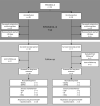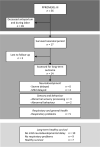Child outcomes after amnioinfusion compared with no intervention in women with second-trimester rupture of membranes: a long-term follow-up study of the PROMEXIL-III trial
- PMID: 31984652
- PMCID: PMC7818451
- DOI: 10.1111/1471-0528.16115
Child outcomes after amnioinfusion compared with no intervention in women with second-trimester rupture of membranes: a long-term follow-up study of the PROMEXIL-III trial
Abstract
Objective: To assess the effect of transabdominal amnioinfusion or no intervention on long-term outcomes in children born after second-trimester prelabour rupture of the membranes (PROM between 16+0/7 -24+0/7 weeks) and oligohydramnios.
Population: Follow up of infants of women who participated in the randomised controlled trial: PPROMEXIL-III (NTR3492).
Methods: Surviving infants were invited for neurodevelopmental assessment up to 5 years of corrected age using a Bayley Scales of Infant and Toddler Development or a Wechsler Preschool and Primary Scale of Intelligence. Parents were asked to complete several questionnaires.
Main outcome measures: Neurodevelopmental outcomes were measured. Mild delay was defined as -1 standard deviation (SD), severe delay as -2 SD. Healthy long-term survival was defined as survival without neurodevelopmental delay or respiratory problems.
Results: In the amnioinfusion group, 18/28 children (64%) died versus 21/28 (75%) in the no intervention group (relative risk 0.86; 95% confidence interval [CI] 0.60-1.22). Follow-up data were obtained from 14/17 (82%) children (10 amnioinfusion, 4 no intervention). In both groups, 2/28 (7.1%) had a mild neurodevelopmental delay. No severe delay was seen. Healthy long-term survival occurred in 5/28 children (17.9%) after amnioinfusion versus 2/28 (7.1%) after no intervention (odds ratio 2.50; 95% CI 0.53-11.83). When analysing data for all assessed survivors, 10/14 (71.4%) survived without mild neurodevelopmental delay and 7/14 (50%) were classified healthy long-term survivor.
Conclusions: In this small sample of women suffering second-trimester PROM and oligohydramnios, amnioinfusion did not improve long-term outcomes. Overall, 71% of survivors had no neurodevelopmental delay.
Tweetable abstract: Healthy long-term survival was comparable for children born after second-trimester PROM and treatment with amnioinfusion or no intervention.
Keywords: Follow up; infant development; neurodevelopment; oligohydramnios; second-trimester prelabour rupture of the membranes.
© 2020 The Authors. BJOG: An International Journal of Obstetrics and Gynaecology published by John Wiley & Sons Ltd on behalf of Royal College of Obstetricians and Gynaecologists.
Figures
Comment in
-
Abandon ship?BJOG. 2021 Jan;128(2):302. doi: 10.1111/1471-0528.16187. Epub 2020 Mar 12. BJOG. 2021. PMID: 32115855 No abstract available.
Similar articles
-
Amnioinfusion in preterm premature rupture of membranes (AMIPROM): a randomised controlled trial of amnioinfusion versus expectant management in very early preterm premature rupture of membranes--a pilot study.Health Technol Assess. 2014 Apr;18(21):1-135. doi: 10.3310/hta18210. Health Technol Assess. 2014. PMID: 24713309 Free PMC article. Clinical Trial.
-
Amnioinfusion Compared With No Intervention in Women With Second-Trimester Rupture of Membranes: A Randomized Controlled Trial.Obstet Gynecol. 2019 Jan;133(1):129-136. doi: 10.1097/AOG.0000000000003003. Obstet Gynecol. 2019. PMID: 30531572 Clinical Trial.
-
Amnioinfusion in very early preterm prelabor rupture of membranes (AMIPROM): pregnancy, neonatal and maternal outcomes in a randomized controlled pilot study.Ultrasound Obstet Gynecol. 2014 May;43(5):490-9. doi: 10.1002/uog.13258. Ultrasound Obstet Gynecol. 2014. PMID: 24265189 Clinical Trial.
-
Amnioinfusion versus Usual Care in Women with Prelabor Rupture of Membranes in Midtrimester: A Systematic Review and Meta-Analysis of Short- and Long-Term Outcomes.Fetal Diagn Ther. 2022;49(7-8):321-332. doi: 10.1159/000526020. Epub 2022 Jul 14. Fetal Diagn Ther. 2022. PMID: 35835036 Review.
-
Transabdominal amnioinfusion for improving fetal outcomes after oligohydramnios secondary to preterm prelabour rupture of membranes before 26 weeks.Cochrane Database Syst Rev. 2013 Aug 3;2013(8):CD009952. doi: 10.1002/14651858.CD009952.pub2. Cochrane Database Syst Rev. 2013. PMID: 23913522 Free PMC article. Review.
Cited by
-
Long-term outcomes following antenatal exposure to low-dose aspirin: study protocol for the 4-year follow-up of the APRIL randomised controlled trial.BMJ Open. 2022 Aug 8;12(8):e060632. doi: 10.1136/bmjopen-2021-060632. BMJ Open. 2022. PMID: 35940829 Free PMC article.
-
Pessary or progesterone to prevent preterm birth in women with short cervical length: protocol of the 4-6 year follow-up of a randomised controlled trial (Quadruple-P).BMJ Open. 2022 Aug 24;12(8):e064049. doi: 10.1136/bmjopen-2022-064049. BMJ Open. 2022. PMID: 36002221 Free PMC article.
-
Long-term follow-up of children exposed in-utero to progesterone treatment for prevention of preterm birth: study protocol of the AMPHIA follow-up.BMJ Open. 2021 Sep 21;11(9):e053066. doi: 10.1136/bmjopen-2021-053066. BMJ Open. 2021. PMID: 34548367 Free PMC article.
-
Atosiban versus placebo in the treatment of threatened preterm birth between 30 and 34 weeks gestation: study protocol of the 4-year APOSTEL 8 follow-up.BMJ Open. 2024 Jul 18;14(7):e083600. doi: 10.1136/bmjopen-2023-083600. BMJ Open. 2024. PMID: 39025819 Free PMC article.
References
-
- Williams O, Michel B, Hutchings G, Debauche C, Hubinont C. Two‐year neonatal outcome following PPROM prior to 25 weeks with a prolonged period of oligohydramnios. Early Hum Dev 2012;88:657–61. - PubMed
-
- Nourse CB, Steer PA. Perinatal outcome following conservative management of mid‐trimester pre‐labour rupture of the membranes. J Paediatr Child Health 1997;33:125–30. - PubMed
-
- Mercer BM. Preterm premature rupture of the membranes: current approaches to evaluation and management. Obstet Gynecol Clin North Am 2005;32:411–28. - PubMed
-
- Hibbard JU, Hibbard MC, Ismail M, Arendt E. Pregnancy outcome after expectant management of premature rupture of the membranes in the second trimester. J Reprod Med 1993;38:945–51. - PubMed
-
- Vintzileos AM, Campbell WA, Nochimson DJ, Weinbaum PJ. Degree of oligohydramnios and pregnancy outcome in patients with premature rupture of the membranes. Obstet Gynecol 1985;66:162–7. - PubMed
Publication types
MeSH terms
Substances
LinkOut - more resources
Full Text Sources



